 Petzlover
Petzlover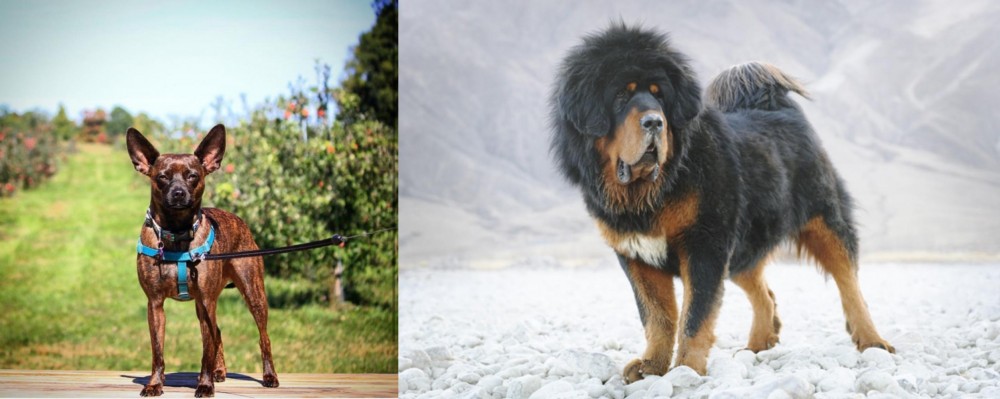 Bospin is originated from United States but Tibetan Mastiff is originated from China. Bospin may grow 45 cm / 17 inches shorter than Tibetan Mastiff. Bospin may weigh 79 kg / 174 pounds lesser than Tibetan Mastiff. Both Bospin and Tibetan Mastiff has almost same life span. Both Bospin and Tibetan Mastiff has same litter size. Bospin requires Low Maintenance. But Tibetan Mastiff requires Moderate Maintenance
Bospin is originated from United States but Tibetan Mastiff is originated from China. Bospin may grow 45 cm / 17 inches shorter than Tibetan Mastiff. Bospin may weigh 79 kg / 174 pounds lesser than Tibetan Mastiff. Both Bospin and Tibetan Mastiff has almost same life span. Both Bospin and Tibetan Mastiff has same litter size. Bospin requires Low Maintenance. But Tibetan Mastiff requires Moderate Maintenance
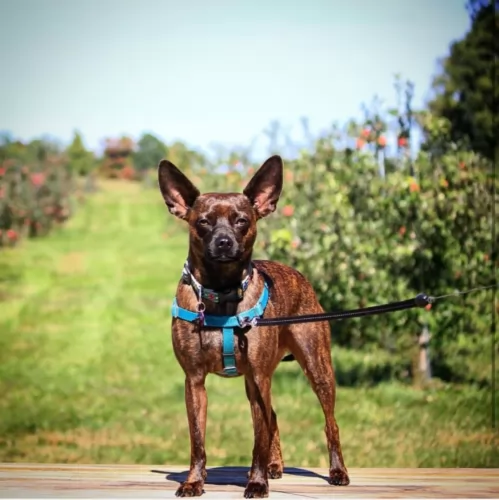 The Bospin is a fairly new breed of dog and is the result of cross-breeding between the Boston Terrier and the Miniature Pinscher.
The Bospin is a fairly new breed of dog and is the result of cross-breeding between the Boston Terrier and the Miniature Pinscher.
Mixed breed dogs are often healthier than full blood dogs and are becoming a popular choice. The origin of the Bospin is unknown. We know that the Boston Terrier hails from Boston in the USA and the Miniature Pinscher from Germany.
 The Tibetan Mastiff is still considered to be a primitive breed originating in Tibet centuries ago. The breed was developed to guard property and livestock. They still do this as well as being a much loved family dog and a show dog as well. There is very little history that is documented for the breed prior to the 19th century.
The Tibetan Mastiff is still considered to be a primitive breed originating in Tibet centuries ago. The breed was developed to guard property and livestock. They still do this as well as being a much loved family dog and a show dog as well. There is very little history that is documented for the breed prior to the 19th century.
Believed to be centuries old with ancestors who are mastiff like dogs that developed into two different types of Tibetan Mastiffs. These types are the Tsang-Khyi and the Do-Khyi. The Tsang Khyi were guardians for Tibetan monks, while the Tsang-Khyi guarded flocks for nomadic shepherds and in villages.
The first Tibetan Mastiff was imported in 1847 to England and presented as a gift to Wueen Victoria, from India’s Viceroy. By 1873 there was an English Kennel Club and the breed was labeled a large dog from Tibet and entered into the EKC Stud Book.
The next year the future King Edward VII, brought another two Tibetan Mastiffs to the United Kingdom to show in 1875. The first breed club began in 1931. The world wars interfered and no new dogs were imported to England until 1976. Two dogs were given to the President of the United States in the late 1950’sbut were not bred and it wasn’t until 1970 that any more were imported. The US Tibetan Mastiff Club was not founded until 1974 and they were first entered in a National Specialty show in 1979.
In 2007 the AKC recognized the breed as a working dog since 2007. It’s hard to find a purebred Tibetan Mastiff in Tibet anymore.
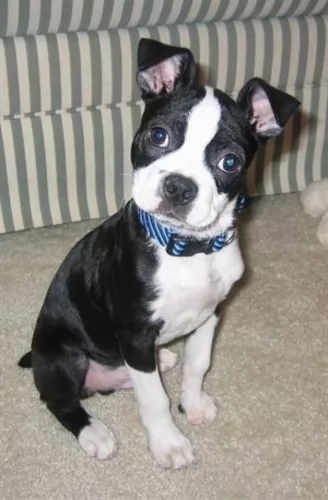 The Bospin, a cross between the smooth haired Boston Terrier and the Miniature Pinscher can actually get any combination and characteristics of either of these two breeds. found in either breed. The Bospin in a small to medium sized dog who can live to be up to 15 years of age.
The Bospin, a cross between the smooth haired Boston Terrier and the Miniature Pinscher can actually get any combination and characteristics of either of these two breeds. found in either breed. The Bospin in a small to medium sized dog who can live to be up to 15 years of age.
He has a short coat, but his looks will essentially depend on which is the more dominant breed. Regardless of which breed he takes after in looks, he will be a muscular little dog with long, lean legs and a long tail. They have small muzzles and a fairly long nose with brown eyes and upright ears. The short coat can be in a number of colours such as brown, beige or brindle, with black and white being a more common colour.
The Bospin’s personality can be a blend of the Boston Terrier and the Miniature Pinscher. They’ve become such popular little dogs, full of fun and just loving to be with their human family. Because they are fairly even tempered, they make excellent family pets and will get on well with children in the home as well as other pets. This is a small dog but he isn’t a yapper. He isn’t going to make a wonderful watchdog as he can be quite friendly with strangers.
 Both types of Mastiffs can be present in the same litter, so that both larger and smaller pups are present. Both types are well-muscled and structured. Today’s dogs being developed in China and the West are much larger than the previous ones. These dogs would be less useful to the nomads and cost too much to feed. Today’s dog is very large with a large head and a long double coat. This coat can be black, brown, gold, and blue, with or without tan markings. There are now a few white Tibetan Mastiffs being bread.
Both types of Mastiffs can be present in the same litter, so that both larger and smaller pups are present. Both types are well-muscled and structured. Today’s dogs being developed in China and the West are much larger than the previous ones. These dogs would be less useful to the nomads and cost too much to feed. Today’s dog is very large with a large head and a long double coat. This coat can be black, brown, gold, and blue, with or without tan markings. There are now a few white Tibetan Mastiffs being bread.
The breed standard for the Mastiff is different in the West than in the East. In the East the breed is broken into two categories – the Lion Head and the Tiger head.
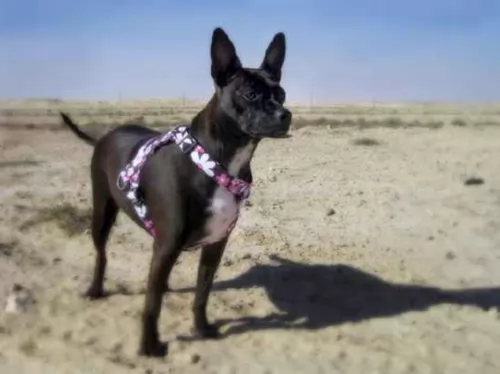 The Bospin is an adaptable dog and can easily fit into farm life or city life. When he is trained and socialized he makes an amicable pet, ready to be a loyal and devoted companion.
The Bospin is an adaptable dog and can easily fit into farm life or city life. When he is trained and socialized he makes an amicable pet, ready to be a loyal and devoted companion.
The Bospin’s personality can actually lean more towards either the Boston Terrier or the Miniature Pinscher, but you’re always going to have fun and games with these entertaining little dogs. They just love the companionship of their human family.
A Bospin needs to be brought into a stable environment so that he can adapt to his new home easily and not be confused by constant changes. Be responsible with your pet and make him one of your family and you’ll be rewarded with an entertaining, fun, loyal 4-legged friend.
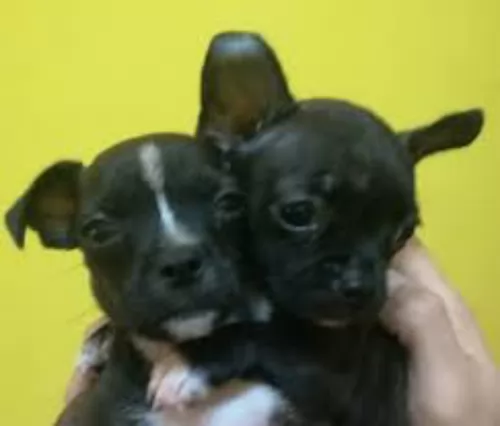 Your Bospin is a healthy dog breed, but the most healthiest pets can fall victim to health problems. There are some conditions that are specific to certain types of dogs and smaller breeds have their own set of worrisome dog ailments.
Your Bospin is a healthy dog breed, but the most healthiest pets can fall victim to health problems. There are some conditions that are specific to certain types of dogs and smaller breeds have their own set of worrisome dog ailments.
Smaller dogs or toy breeds have smaller skulls and sometimes their smaller mouths have to find room to house the 42 teeth that dogs have. This over-crowding can lead to dental disease.
This is a common problem in brachycephalic breeds – those dogs that have short, broad muzzles such as the Boston Terrier. Toy breeds are more prone to tracheal collapse, a common cause of airway obstruction in dogs where the dog develops a rasping cough and labored breathing.
This is a developmental orthopedic disease where you see degeneration of the femoral head and which can lead to arthritis. The disease affects young animals and more specifically toy breeds. Your dog will have trouble walking and will usually hold one leg up. Your dog can battle along with pain and arthritis.
 Though considered a primitive dog and isolated for several centuries, so they should not have as many genetic or inherited conditions as other dogs with more cross and in-breeding. These are the potential health issues they might develop:
Though considered a primitive dog and isolated for several centuries, so they should not have as many genetic or inherited conditions as other dogs with more cross and in-breeding. These are the potential health issues they might develop:
Elbow and Hip dysplasia – can lead to lameness and arthritis.
OCD Osteochondrois Dissecans – this is also an orthopedic condition when the soft tissue growth is abnormal in the joints. It is painful and the joint is stiff. Don’t breed a dog that has this condition.
Panosteitis – Canine growing pains. Inflammation of the long bones in large dogs as they grow. They will eventually out grow it. Pain can be managed through medication.
Autoimmune Hypothyroidism – Hormone deficiency leading to flaky skin, weight gain and lack of energy. Can be managed through medication.
Canine Inherited Demyelinative Neuropathy – If your Tibetan Mastiff is going to have this condition, they will have it by six weeks of age. Weakness in the hind legs leading to paralysis.
Bloat – deadly if not treated immediately and related to dietary habits.
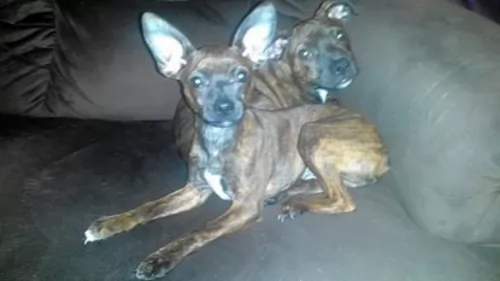 Because of the short coat and minimum shedding, your Bospin will only require minimal maintenance. Brush him down at least twice a week to keep the short coat free of loose hair and to also keep it shiny and glossy. As with any other dog breed, he should have his teeth brushed at 2 or 3 times a week with special dog toothpaste and toothbrush. Don’t be tempted to use human toothpaste. Check his ears too to make sure they are free of dirt and infection.
Because of the short coat and minimum shedding, your Bospin will only require minimal maintenance. Brush him down at least twice a week to keep the short coat free of loose hair and to also keep it shiny and glossy. As with any other dog breed, he should have his teeth brushed at 2 or 3 times a week with special dog toothpaste and toothbrush. Don’t be tempted to use human toothpaste. Check his ears too to make sure they are free of dirt and infection.
The Bospin is a hybrid breed and because he comes from two energetic dogs, you’ll need to provide him with activities to keep him busy. He will love to go on a walk with you and you can play ball games with him in the garden or even indoors. He isn’t a working dog so he isn’t going to demand too much activity, but it is better to get into the habit of exercising him regularly to keep him in good shape and to maintain his good health.
Bospins need to be fed carefully to avoid weight issues or health problems. Puppies need to eat frequently - 4 times a day. For your Bospin, always go for top quality commercially produced dog foods where meat is the top ingredient. Home made foods are always a wonderful choice for your pet and this can include meat, rice and vegetables.
If you’re unsure about feeding your dog, get advice from your vet. Always have fresh, cool water available and make sure you wash out the water bowl regularly.
 Don’t feed the puppy too much protein as you want to prevent Panosteitis and growing too quickly. Do not overfeed. Feed 4-5 cups of high quality large breed puppy food in 3-4 meals day.
Don’t feed the puppy too much protein as you want to prevent Panosteitis and growing too quickly. Do not overfeed. Feed 4-5 cups of high quality large breed puppy food in 3-4 meals day.
4 to 6 or more cups of a high-quality dog food daily, divided into two meals. To avoid bloat do not feed before or after vigorous exercise.
Calm and laid back when inside.
They need 20-30 minutes of vigorous exercise and play daily. They prefer to play with other large dogs.